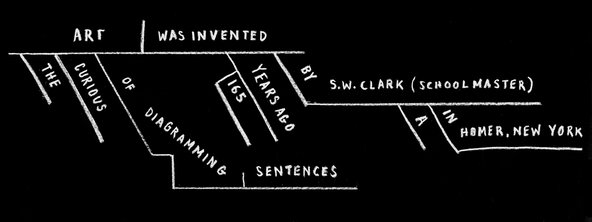A Picture of Language
The curious art of diagramming sentences was invented 165 years ago by S.W. Clark, a schoolmaster in Homer, N.Y. [1] His book, published in 1847, was called “A Practical Grammar: In which Words, Phrases, and Sentences Are Classified According to Their Offices and Their Various Relations to One Another.” His goal was to simplify the teaching of English grammar. It was more than 300 pages long, contained information on such things as unipersonal verbs and “rhetorico-grammatical figures,” and provided a long section on Prosody, which he defined as “that part of the Science of Language which treats of utterance.”
It may have been unwieldy, but this formidable tome was also quite revolutionary: out of the general murk of its tiny print, incessant repetitions, maze of definitions and uplifting examples emerged the profoundly innovative, dazzlingly ingenious and rather whimsical idea of analyzing sentences by turning them into pictures. “A Practical Grammar” was a reaction against the way the subject had been taught in America since it began to be taught at all.
Before diagramming, grammar was taught by means of its drabber older sibling, parsing. Parsing is a venerable method for teaching inflected languages like Latin; the word itself is schoolboy slang derived from pars orationis, Latin for “a part of speech.” Sometime in the 18th century, teachers began to realize that practical skills were more useful to young people than classical languages, and that the ability to speak English didn’t necessarily mean that a student spoke it well, wrote it correctly or understood its structure. To teach it, they borrowed the concept of parsing from the classical tradition in which they themselves had been trained.
Put simply, parsing requires the student to break down a sentence into its component words, classifying each in terms of its part of speech, as well as its tense, number and function in the sentence.


